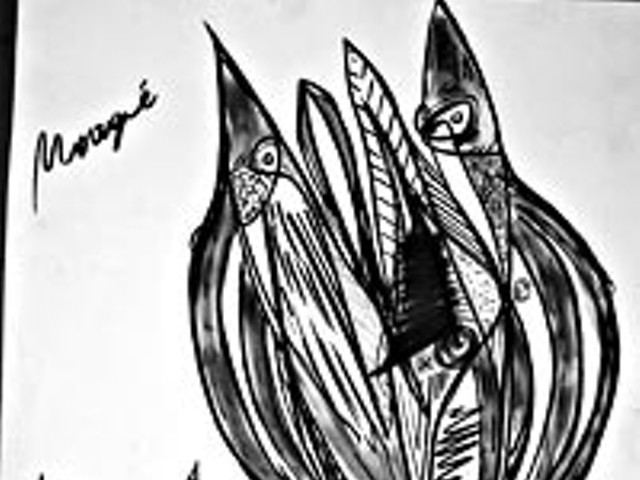On a pleasant Thursday, the Bagley-Trumbull Market bustles with business. Owner Felix Formosa busily rings up orders of canned goods, cigarettes, fresh produce and 40-ounce beers. He knows many of his customers by name or by their usual purchases. The soft-spoken Formosa expresses a deep connection to the neighborhood in which he not only works, but has lived his entire life.
Emblematic of many in Corktown, Formosa is a third-generation resident who owns his grandfather’s store and lives in his grandfather’s house.
Kelli Kavanaugh, administrator of Corktown’s Citizens District Council (CDC) and neighborhood resident, says Corktown is home to many long-term residents. “Houses stay in the family,” Kavanaugh says, “There is a small-town feeling here, but with a sense of privacy. You know everyone in the neighborhood.”
Detroit’s oldest neighborhood, Corktown was founded by Irish immigrants and took its name from Ireland’s County Cork; Maltese, Latino, Asian and other immigrants have followed. Today, the neighborhood is composed almost equally of blacks, whites and Latinos. “We’re proud of the fact that we are so stably integrated,” says Kavanaugh.
On Bagley, a four-family housing development is in the works for a currently vacant lot. The units will be of mixed price range, a factor that Mark Faremouth, the community development coordinator at the CDC, says helps to enhance diversity.
“You get people of different economic backgrounds living right next door to one another,” he says.
That development is indicative of the direction in which Corktown is headed as the CDC works to restore the area and preserve the historic qualities of its buildings and locales. Michigan Avenue in particular, has been a focus. But the big change there has been the now-Tigerless Tiger Stadium, its future still uncertain after being vacant for two years. Formosa says that while he misses the major-league attraction, from a business perspective, “It is easier to live around here now without it. The area is more family-oriented now.” Corktown residents and the CDC hope to see the vacant stadium revitalized and used in a way that benefits the community.
Safety is a top priority in Corktown. “Everybody looks out for one another here. The community helps each other, everyone gives a helping hand,” Formosa says. His comments echo those of his neighbors and reflect the sense of security that most Corktown inhabitants feel. Because Corktown is such a small area, encompassing roughly one square mile, suspicious activity is quick to be noticed; residents are even quicker to act upon it.
Kavanaugh describes the aftermath of recent break-ins. “Right away there were neighborhood watches, safety classes and a higher alert in the community,” she says. “The break-ins were a huge scandal.”
But Kavanaugh emphasizes that crime is low in Corktown and when something does occur, such as a robbery, there is a system of support for the victims. “If someone gets robbed, they are not alone to deal with it,” Kavanaugh says.
Rob McDonald, owner of Eph McNally’s sandwich shop at the corner of Brooklyn and Porter, says that safety was just one of the many factors that attracted him to the area 10 years ago. “You have small businesses that don’t have bulletproof glass. It’s a throwback to 40 or 50 years ago,” McDonald says. He also enjoys the crowd that makes his shop a popular neighborhood hangout, from artists to police officers to the White Stripes.
Kavanaugh and Faremouth say that the biggest problem in Corktown is the absence of services, such as a supermarket, Laundromat and video stores. “We have good cultural activities, entertainment, bars, dining and churches, but no retail,” says Kavanaugh.
What Corktown lacks in shopping, it makes up for in festivals and community activities. A number of annual events are organized and held in Corktown, including a St. Patrick’s parade on Michigan Avenue, a community yard sale, a neighborhood picnic, the home and garden tour, neighborhood cleanups, the Irish-Mexican Festival and the Corktown chalk-walk. (See more on the Irish-Mexican Festival in Streets of new Mexico. The picnic is set for July 14 at Dean Savage Park; cleanups are set for June 22 around the stadium and July 6 in Dean Savage Park.)
Corktown continues to move forward, while simultaneously holding on to the past. The quiet streets lined with renovated Victorian-style houses seem as though they belong in small-town U.S.A. rather than a major city such as Detroit.
Yet even for Formosa, whose roots are so firmly planted here, there are still surprises. “You always hear a new story, every day,” he says. “When you think you’ve heard it all, you hear something new.”
Return to the introduction of this special Metro Times Summerguide 2002 neighborhood profile. Tricia Woolfenden is an editorial intern at Metro Times. E-mail [email protected]





